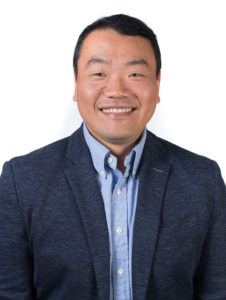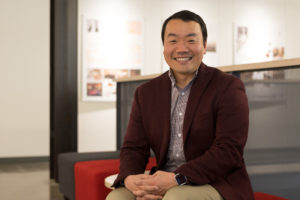Student writer Andrea Day contributed to this story.

The School of Education at Colorado State University is pleased to welcome organizational change expert Dae Seok Chai to the Organizational Learning, Performance, and Change graduate program. Chai is a tenure-track assistant professor, teaching courses related to performance, culture, expatriation, and quantitative research methods.
“Dr. Chai has been a very productive researcher who is early in his career,” said program coordinator Thomas Chermack. “He brings a unique combination of an international perspective and advanced data analysis skills to the program.”
From South Korea to the U.S.
Born and raised in South Korea, Chai served in the South Korean Air Force in human resource management and development before coming to the United States to visit his uncle in North Carolina. During that visit, Chai saw the learning opportunities in the U.S. and was inspired to apply to the University of Georgia. After being accepted to UGA, Chai studied business education, planning to become an educator – but became interested in the basics of organizational change instead.
“When I got to UGA, I experienced a lot and interacted with both international and American students, which allowed me to identify their differences,” said Chai. “That’s when I became practically interested in culture and why people are so different. But it was undergrad, so I didn’t delve deeper.”
During his senior year at UGA, Chai was introduced to the human resource development program at UGA. After graduating, he earned his Georgia teaching certificate, then decided to pursue graduate studies in human resource development.
“Education is where I believe we have hope,” he said. “Developing people’s minds is what I want to do, and I found that human resource development did that in various types of organizations, particularly in the private sector.”
Following a passion
Chai attended the University of Minnesota in Minneapolis/St. Paul for his master’s degree in human resource development. Through the program, he was able to study the inclusion of culture in human resources and the topic of expatriates in business.
After earning his master’s degree, Chai returned to South Korea to gain work experience in human resource development. He worked for a large conglomerate as a human resource development assistant manager and cross-cultural trainer focusing on expatriates.
“In the OLPC or HRD field, work experience is strongly recommended. Without work experience, it’s difficult to delve deeper than theories or models and general knowledge,” Chai said. “As a teacher with work experience, I can synthesize and teach the information I learned on the job.”
After three years in South Korea, Chai returned to the U.S. to earn his Ph.D. at Texas A&M University in College Station, Texas. There, he studied cross-cultural competencies and leadership in diverse culture contexts, and continued to study expatriates. His studies were heavily influenced and improved by his personal and professional experience, and international associations.
“My research interest is culture, overall,” said Chai. “Cross-culture, inter-culture, organizational culture; I’m interested in them all.”
From student to teacher
 In 2016, Chai joined the faculty at Western Michigan University as an assistant professor of organizational change leadership. There, he assisted in the development of curriculum for the new Organizational Change Leadership program. He also conducted research and taught graduate courses that included his passions for culture.
In 2016, Chai joined the faculty at Western Michigan University as an assistant professor of organizational change leadership. There, he assisted in the development of curriculum for the new Organizational Change Leadership program. He also conducted research and taught graduate courses that included his passions for culture.
“At my previous institutions, I tried to embrace a lot of international competence and cultural competence in the curriculums I taught,” said Chai. “For example, I taught organizational change and leadership where two or three sessions included international human research development and cross-cultural competencies.”
While WMU was a supportive baseline for Chai’s teaching career, he was attracted to CSU because of the faculty, research, teaching, and service. In particular, Chai was drawn to the opportunity to be mentored by OLPC program faculty members Chermack and Susan Lynham – faculty members who are well-known in the field of human resource development.
Chai was also interested in, and has become involved with, many of the research and teaching resources at CSU. He believes that CSU invests in the future of not only his program, but all existing fields.
“The OLPC program is structured well, and has a unique and well-developed curriculum that can’t be found anywhere else,” he said. “CSU, in general, is incredibly supportive with all of the resources they provide.”
A future at CSU
Chai currently teaches introductory and intermediate statistics courses, as well as courses on organizational change. He looks forward to introducing a new outlook on cross-cultural aspects and paradigms to students in the OLPC program.
“Based on my time and education in both Korea and the United States, I have a mixture of experiences to bring,” said Chai. “It’s important to know foundational basic course aspects, but at the same time, it’s very important for me to expand students’ perspectives and paradigms. That’s what I’m contributing to the OLPC program, the School of Education, and CSU as a whole.”
Chai is already enjoying his time at CSU and anticipates a continued positive experience throughout his career.
“The faculty members here at the School of Education are very supportive, friendly, and willing to help. I just open my door slightly, and people stop in to see how I’m doing and adjusting,” Chai said. “They’re all really interested in me as a person, which is nice.”
The School of Education is part of CSU’s College of Health and Human Sciences.